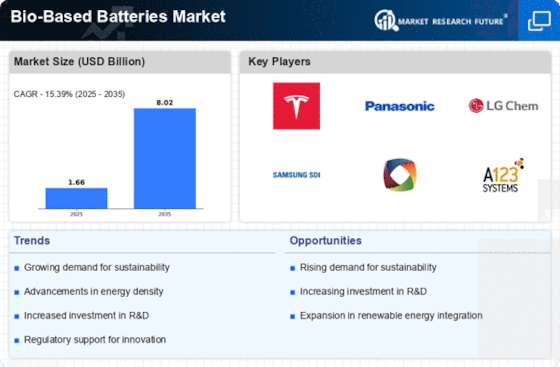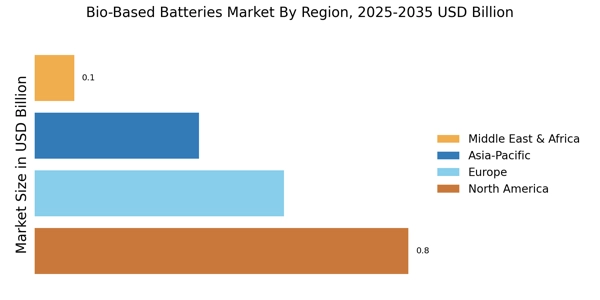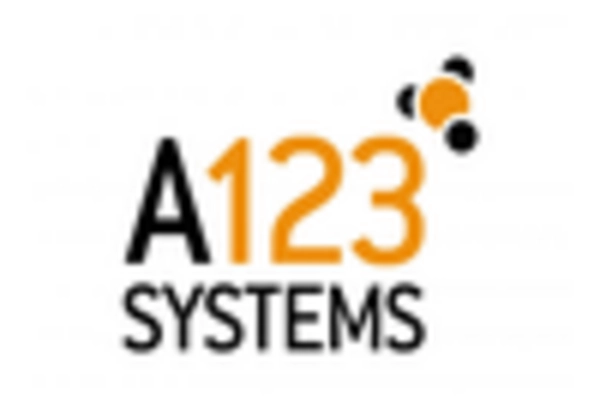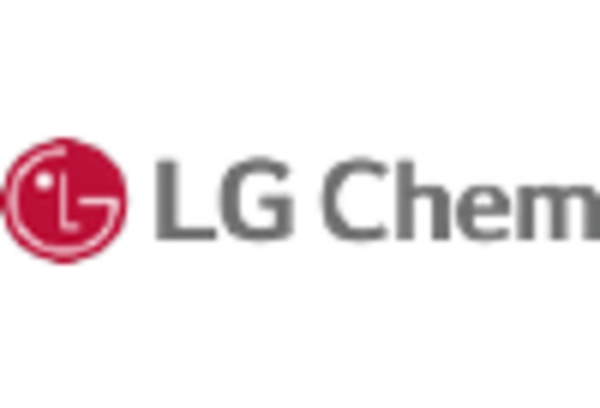Growing Electric Vehicle Market
The expansion of the electric vehicle (EV) market is a significant driver for the Bio-Based Batteries Market. As the automotive sector increasingly shifts towards electrification, the demand for efficient and sustainable battery solutions is surging. Bio-based batteries offer a promising alternative to conventional lithium-ion batteries, particularly in terms of sustainability and environmental impact. The EV market is projected to grow at a CAGR of over 20% in the coming years, which could lead to a substantial increase in the demand for bio-based batteries. This trend suggests that the Bio-Based Batteries Market is well-positioned to capitalize on the growing need for eco-friendly energy storage solutions in the automotive sector.
Rising Demand for Sustainable Energy Solutions
The increasing global emphasis on sustainability is driving the Bio-Based Batteries Market. As consumers and industries alike seek alternatives to traditional fossil fuel-based energy sources, bio-based batteries present a viable solution. The market for bio-based batteries is projected to grow at a compound annual growth rate (CAGR) of approximately 15% over the next five years. This growth is fueled by the need for cleaner energy storage options that align with environmental goals. Companies are investing in research and development to enhance the efficiency and performance of bio-based batteries, which could lead to wider adoption across various sectors, including automotive and renewable energy. The Bio-Based Batteries Market is thus positioned to benefit from this shift towards sustainable energy solutions.
Technological Advancements in Battery Production
Technological innovations are playing a crucial role in the evolution of the Bio-Based Batteries Market. Recent advancements in materials science and engineering have led to the development of more efficient and cost-effective bio-based batteries. For instance, the integration of nanotechnology in battery design has shown promise in enhancing energy density and reducing charging times. As production techniques improve, the cost of bio-based batteries is expected to decrease, making them more accessible to consumers and businesses. The Bio-Based Batteries Market is likely to see a surge in demand as these technologies mature, potentially leading to a market size exceeding USD 10 billion by 2030. This trend indicates a strong future for bio-based battery solutions.
Government Policies and Environmental Regulations
Government policies aimed at reducing carbon emissions are significantly influencing the Bio-Based Batteries Market. Many countries are implementing stringent regulations that encourage the adoption of renewable energy technologies, including bio-based batteries. Incentives such as tax breaks and subsidies for companies investing in sustainable technologies are becoming more common. For example, recent legislation in several regions mandates a certain percentage of energy storage solutions to be derived from renewable sources. This regulatory environment is likely to propel the Bio-Based Batteries Market forward, as businesses seek to comply with these regulations while also meeting consumer demand for greener products. The market is expected to expand as a result of these supportive policies.
Consumer Awareness and Preference for Eco-Friendly Products
There is a notable shift in consumer preferences towards eco-friendly products, which is positively impacting the Bio-Based Batteries Market. As awareness of environmental issues increases, consumers are more inclined to choose products that are sustainable and have a lower carbon footprint. This trend is particularly evident among younger demographics, who prioritize sustainability in their purchasing decisions. Companies in the Bio-Based Batteries Market are responding by developing products that not only meet performance standards but also align with consumer values. Market Research Future indicates that nearly 70% of consumers are willing to pay a premium for sustainable products, which could drive further growth in the bio-based battery sector. This consumer behavior is likely to shape the future landscape of the Bio-Based Batteries Market.

















